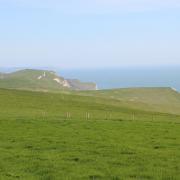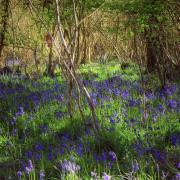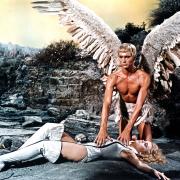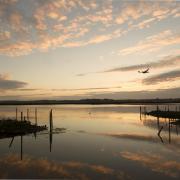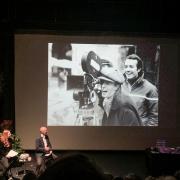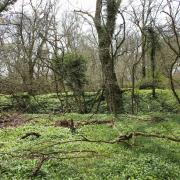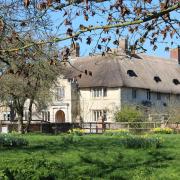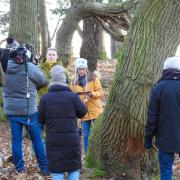The critically-acclaimed music of East India Youth has echoes of a Dorset childhood
Rapturous rock writers raving about East India Youth’s acclaimed album Total Strife Forever have reached for comparisons with David Bowie’s Berlin trilogy, Brian Eno and Philip Glass. East India Youth is the musical moniker of 23 year-old Bournemouth-born Will Doyle, who includes “neo-classical, noise, Detroit techno and pop” among the influences on the album. A surprising list, for a musician who, only five years or so ago, was performing solo with an acoustic guitar at open mic nights.
Total Strife Forever (TSF) was started in 2010-11. Will had been living in London, composing electronic instrumentals, during a rough patch with his hotly-tipped, Southampton-based indie band Doyle and the Fourfathers (think Pulp: anti-style as a style, social comment as wry personal observation). Will says that the first of these pieces, eventually titled Total Strife Forever III, was inflected by the work of Shostakovich, Bjork and Sufjan Stevens.
A year or so later, Doyle and the Fourfathers split, Will holed up at his manager’s flat in East India Docks and hastily completed his works in progress of the previous 18 months to make the album. His first adventures in electronica so enthused John Doran, editor of music blog The Quietus, that he set about forming a record label, Stolen Recordings, to release them. This is some accolade in itself: Doran has previously declared that he would cut his own head off with nail clippers rather than start a label.
The pain was worth it. Reviewers queued to praise Total Strife Forever – not only the on-the-pulse music blogs like The 405 (“incredible”), Line of Best Fit (“breathtaking”) and Drowned in Sound (“masterly”), but journals of the mid-life rocker such as Mojo (“a triumph”) and Q, along with NME and Guardian Music. Will has been performing the music solo, including shows in Russia, and has more dates this summer, including festivals such as Latitude, Standon Calling and Green Man.
A striking feature of the music scene in the last decade has been the convergence of taste between 50- and 20-somethings, and points inbetween. Young folk musicians idolise John Martin and Nick Drake; rockers have returned to Led Zeppelin and prog-rock and now the electronica of Eno and even “Krautrock” – Kraftwerk, Can, Neu! et al – are back in vogue. Will says of his influences: “My favourite period in music is the late 70s, particularly Bowie and Eno, but Talking Heads as well. I’ve been revisiting Eno’s work recently; around 1977 he was producing a staggering range of albums and he was also bringing out very influential albums of his own, like Music for Airports.”
East India Youth, too, has been finding a live following among listeners who are over 40 and who might have heard those influential vinyl albums as younger fans. “Yes, I’m pleasantly surprised that a massive range of people are coming to the gigs, emailing me and buying the album,” says Will. TSF has been pressed up as a double vinyl album, a rare thing for a debut, perhaps to attract those who still put the needle to the record.
Will was born at Boscombe Hospital and lived in Charminster till the age of 12. He began studying music at St Luke’s Primary School, where he learned the violin. Many promising violinists over the years must have succumbed to the teen boys’ ultimate crush, the guitar, and Will joined them when he moved to Porchester Boys’ School in year 7 and took up the six-string. “The guitar was much more interesting than violin at that age! But I kinda wish I’d kept up violin now…” he confesses.
Will’s childhood memories of Bournemouth, despite the town’s renowned seven-mile strand, are not of sun and sand. “I didn’t go to the beach much in summer,” he says. “I suppose when you’re born there and live near the sea, it’s not so much of a novelty. I would tend to go down to the beach more in winter-time, or walk on Hengistbury Head.”
The influence of the changeable sea persists in Will’s music today. This is most clearly evident in the track Coastal Reflexions, which uses railway announcements from a journey on the line connecting Southampton and Brighton over a pulsing triple synth beat that could be the rhythm of waves breaking and receding. A fellow-musician born in Wyke Regis has also noted that he could hear the sea and the coast in Will’s music. “It was interesting thinking about that,” muses Will. “There is something that evokes that atmosphere. There will always be some influence from the coast and the sea in what I do.”
Will is now busy performing to promote the album. Was it difficult to adapt electronic work to a live show? “It was! I was more used to playing in bands. It felt weird to go back to being solo on stage, but with a lot more to consider and a lot more to put across,” Will confides. He is performing solo, deciding against recruiting musicians to help because he wanted to play live as soon as possible after mixing the album. “It would have taken a long time to find the right musicians and rehearse. I wanted to get out there and start doing it,” he says.
Initially it was, he says, “nerve-racking - everything relies on you pressing the right buttons at the right time. When you are in a band, if you mess up or forget something, the other members of the group are fine and you can take a moment to step back and reintroduce yourself, but now the responsibility all rests on me.”
Touring Dates for East India Youth
He will be visible at festivals around the UK including Field Day Festival (London) and Latitude. For a full list of tour dates and venues visit eastindiayouth.co.uk. Total Strife Forever is out on the Stolen Recordings label.




